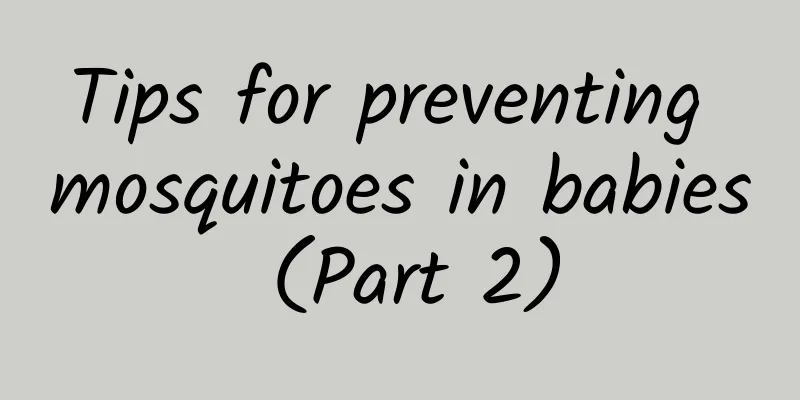Tips for preventing mosquitoes in babies (Part 2)

|
In the previous article, we learned about the living habits of mosquitoes and their preferences for prey. In this article, let’s talk about how to deal with mosquito bites and how to prevent mosquitoes.
Traditional wind oil and cooling oil can relieve itching, but these medicines are not suitable for babies under 2 years old because wind oil and cooling oil generally contain menthol, camphor, and borneol. Although they are effective in repelling mosquitoes and relieving itching, excessive use may affect the nervous system of babies under 2 years old. So what should you do after being bitten by a mosquito? If it is an ordinary mosquito bite, with a slight bulge and no redness or swelling, you can wash the bite wound with soapy water. Weakly alkaline soapy water can neutralize the acidic substances secreted by mosquito saliva and reduce the body's allergic reaction. In addition, ice compresses can also be used to relieve itching and discomfort. If the mosquito bite is red and swollen, the bulge becomes larger, the surrounding skin is red and swollen, and it is extremely itchy, then an allergy may have occurred. Calamine lotion can be used to relieve itching, but be careful to avoid broken skin; if it is not relieved, weak hormone ointment can be used locally; if the skin is scratched or even bleeding, iodine can be applied externally and then Bactroban. One of the active ingredients of many anti-itch products is the antihistamine drug - diphenhydramine, which is not suitable for babies under 2 years old, so parents should keep their eyes open when choosing medicine for their babies, see the ingredients clearly, and don't easily choose overseas shopping products.
There are only two ways to deal with mosquitoes: physical and chemical. The physical method is mainly to separate the baby from mosquitoes and not give mosquitoes a chance to bite. For example, hang a mosquito net or wrap the baby up, leaving no skin exposed, and not giving mosquitoes a chance to bite. In addition, mosquitoes also like to live in humid environments, so timely cleaning of garbage and no stagnant water can reduce the reproduction and stay of mosquitoes. The physical method is suitable for babies of all ages and is safe and non-toxic, but considering the operability, chemical methods should still be used. There are mainly the following types: (1) Light mosquito coils The main active ingredients of mosquito coils are pyrethrins or pyrethroids. Pyrethrins are extracts from chrysanthemums, while pyrethroids are artificially synthesized. Ordinary mosquito coils release mosquito-killing ingredients by burning, while electric mosquito coils release mosquito-killing ingredients into the air by heating, causing mosquitoes to fall into a coma and die. So if the mosquitoes die, will people be in trouble? In fact, the amount of "pyrethrin" inhaled into the bodies of most vertebrates (including humans) will be quickly metabolized and decomposed, so correct use generally does not affect health. Electric mosquito coils are safer than ordinary burning mosquito coils, but it is recommended: ① Try to avoid using electric mosquito coils all night; ② Be sure to open windows for ventilation after mosquito repellent is over; ③ Put the electric mosquito coils where the baby cannot reach them to avoid accidental ingestion. (2) Use mosquito repellent or mosquito repellent bag The principle of mosquito repellent floral water is to cover the skin with a layer of mosquito-unpleasant smell, which will keep mosquitoes away. The mosquito repellent ingredients currently registered with the U.S. Centers for Disease Control and Prevention and the U.S. Environmental Protection Agency include peppermint oil, citronella oil, DEET, chlorpyrifos, picaridin, and lemon eucalyptus oil (see below for details). In addition, there are some natural plant extracts (lemongrass, wormwood, geranium, etc.) that have mosquito repellent effects. However, the repellent time of natural mosquito repellent products is generally short. If you want to repel mosquitoes well, you have to apply it repeatedly, which can easily irritate the baby's skin. Therefore, mothers do not need to reject chemical mosquito repellents. As long as the chemical mosquito repellent ingredients are within a reasonable concentration range, they can be used by babies. ①DEET: DEET for short, developed by the US military and used for civilian purposes in 1957. DEET will quickly form a transparent film when applied to the skin, and its resistance to sweat, water and friction is stronger than other repellents. High concentrations can affect the nervous system, but it is safe to use at the recommended dose. The higher the concentration, the longer the mosquito repellent time (30% concentration can effectively repel mosquitoes for 6 hours, 20% concentration can repel mosquitoes for 4-5 hours, and 5%-10% concentration can repel mosquitoes for 1-3 hours), but it is less safe for babies, so it is recommended that children from 6 months to under 12 years old use products with a concentration of less than 10%, and it is safer to use the product up to 3 times a day. The common DEET content on the market is currently less than 15%, so it can be used with confidence for babies. Although the American Academy of Pediatrics stipulates that infants and young children over 2 months old can use DEET products with a concentration of 10-30%, due to the lack of clinical trial data for babies under 6 months old, it is not recommended for babies under 6 months old to use mosquito repellent products containing DEET. In addition, mosquito repellent containing DEET cannot be used together with sunscreen containing benzophenone. The two react to produce harmful substances. Mothers should pay attention to whether the ingredients conflict when choosing mosquito repellent products and sunscreen. ② DEET: Also known as BAAPE, IR3535, and Imonin, it is a broad-spectrum, highly effective, low-toxic insect repellent. It is less effective than traditional DEET in repelling mosquitoes, has relatively low irritation, and has no skin permeability. Most domestic toilet waters contain this ingredient, but most of them also contain alcohol, which is irritating to the skin and is suitable for babies over 2 months old. ③ Icaridin: Also known as Picaridin, it has good mosquito repellent effect, long protection time, no skin penetration, is safer and less toxic than DEET, and is rated by the US Centers for Disease Control and Prevention as the most effective mosquito repellent besides DEET. The recommended concentration is 5-10%, and it is also prohibited for children under 2 months old. ④ Lemon eucalyptus oil: The only natural plant-based mosquito repellent ingredient recommended by the Centers for Disease Control and Prevention in the United States. It is volatile, and the effect lasts less than 2 hours, requiring repeated application. Due to its volatility, a concentration of 30% is required to have a good mosquito repellent effect. Due to the allergenicity of plant essential oils, the odor is strong, and there is insufficient clinical data on the use of essential oils for children under 3 years old, the CDC, FDA, and AAP clearly state that it should not be used by children under 3 years old. ⑤ Citronella oil: The safety of citronella oil is relatively high in the evaluation of the US EPA. However, the Canadian Ministry of Health believes that the safety data of citronella oil products is still insufficient, including the possible contaminant methyl eugenol, so it is not recommended for infants and young children. There are many mosquito repellents on the market that use citronella oil as the main ingredient, so mothers should be careful and try not to choose products with this ingredient for their babies. ⑥Peppermint oil: Its volatile odor and allergenicity have an inhibitory effect on the nervous system. Excessive use can cause serious adverse reactions such as respiratory arrest in infants and young children. Therefore, it is not recommended for use in mosquito repellent for babies under 2 years old. To ensure the safety of medication, mothers can spray mosquito repellent containing the above-mentioned mosquito repellent chemical ingredients on their own hands first, and then apply it to the baby's exposed hands and feet to prevent overdose. |
<<: Is your child really short?
>>: What are the advantages of sunscreen spray? What is the principle of sunscreen spray?
Recommend
World Parkinson's Day | Three questions to help you understand Parkinson's disease
April 11 is "World Parkinson's Day"...
Why is there still blood after the period?
Many women develop other diseases due to menstrua...
Postpartum pelvic floor recovery training method
A woman's pelvis will change after giving bir...
How is miscarriage most likely to occur in the fifth month?
Women need to be aware that many behaviors may ca...
Is it normal to have menstruation again after two years of amenorrhea?
As we all know, women usually go through menopaus...
What is the progesterone level at 40 days of pregnancy?
Generally, women need to pay special attention to...
What causes women's complexion to be yellow and dull?
Everyone loves beauty. As the saying goes, a whit...
Can you get pregnant by taking medicine to get your period?
Some people do not have menstruation, but after t...
Blood deficiency type menstrual irregularity
Blood deficiency is also a term in Traditional Ch...
Cervical examination bleeding
Before preparing for pregnancy, in order to under...
What medicine is good for women to take to nourish the kidneys?
Many people think that kidney tonification is onl...
Can a second confinement period cure postpartum diseases?
Postpartum sickness has many names, such as postp...
Women should never say these three sentences at a gathering
Women are born to like to form alliances, share h...
What are the symptoms of a bad spleen in women?
Women's bodies need special protection becaus...









